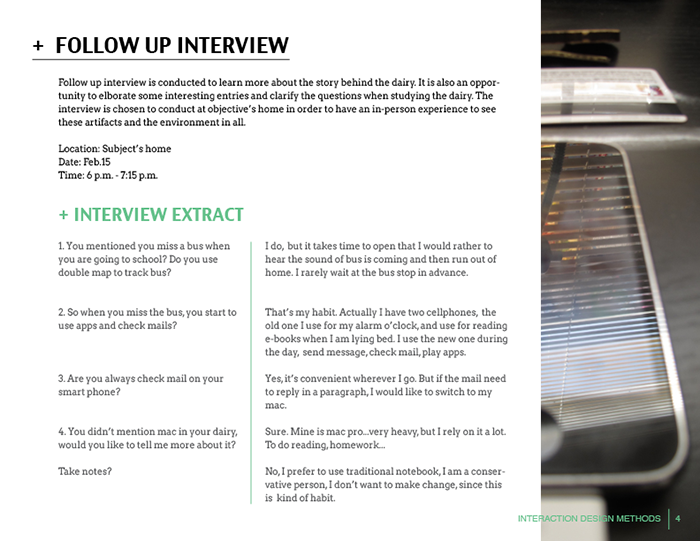DIARY STUDY
BEHAVIORAL | ATTITUDINAL | QUALITATIVE | INNOVATIVE | EXPLORATORY | SELF REPORTING
Using the tool of dairy, researchers can understand the subject’s thought and reflection on everyday things. The self-report method enables researches get more detailed and in-depth information.
01 Definition
Diaries or journals are guiding artifacts that allow people to conveniently and expressively convey personal details about their daily life and events to design teams.
---- Universal Methods of Design
Diary Studies is a longitudinal technique used in User Experience Research primarily to capture data from participants as they live through certain experiences.There are two types of Diary Studies:
1) Elicitation Studies where participants capture media that are then used as prompts for discussion in interviews. The method is a way to trigger the participant’s memory.
2) Feedback Studies where participants answer predefined questions about events. This is a way of getting immediate answers from the participants.
---- Wikipedia
02 NATURES
Notes:
- Focus on users' perspectives, feelings and culture appropriate.
- Some variation: time diaries, incident diaries, experience diaries, cameral journal, ESM.
- Researchers could design the form of notebook to indicate what/when/how they are expected to record.
- Subject has most power during the session, since the method is based on self-observation, introspection and self reporting.
- Diary studies are useful tools in exploratory research, preparing the design for further research.
Suited Context:
- It is useful in generative research and design. Diaries and journals can be issued to sensitize participants to research topics and participatory design.
03 PROCEDURES
- Define problem space and clarify the purpose of the diary.
- Recruit suitable subject who has time and responsibility to do the record.
- Choose appropriate diary types according to scenarios and subjects.
- Design the diary book for her/him with brief instrution, prompt or question.
- Check the progress of subjects to make sure she/he is keeping up with the entries without any questions or concerns.
- Collect and study the diary, in order to figure out any patterns or interesting points.
- Conduct follow-up interviews. Let the subject elaborate and explain their feelings and reflections.
- Write up findings including user profile such as lifestyle, value, belief, and habits.
04 REFLECTION
Limitation
- It's a time consuming way to collect data.
- Participants are required to learn a proper way to document their activity.
Strengths:
- Based on context, which helps understanding users.
- Very focused, researchers could dig deep with relevant inquiries.
- Subjects have more power within the session, they would feel more comfortable to share their experience and express their viewpoints.
05 Case Document













